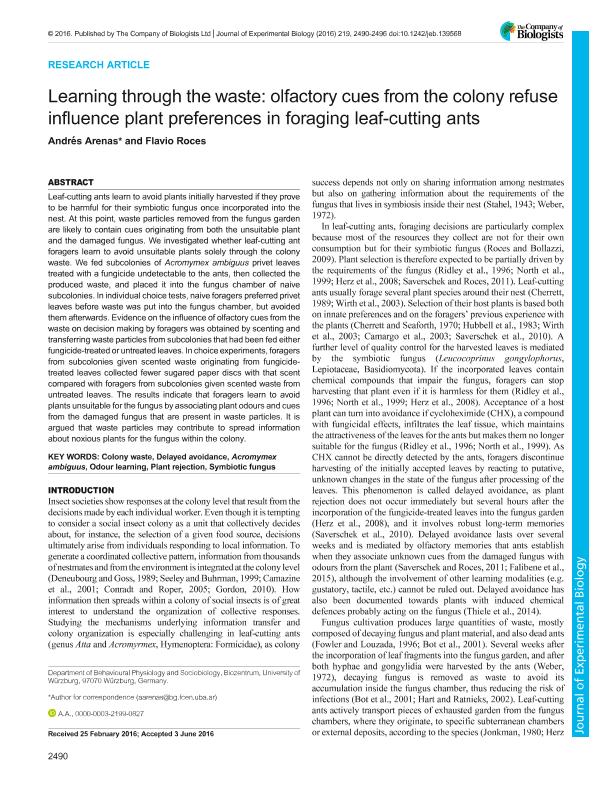Artículo
Learning through the waste: olfactory cues from the colony refuse influence plant preferences in foraging leaf-cutting ants
Fecha de publicación:
08/2016
Editorial:
Company of Biologists
Revista:
Journal of Experimental Biology
ISSN:
0022-0949
e-ISSN:
1477-9145
Idioma:
Inglés
Tipo de recurso:
Artículo publicado
Clasificación temática:
Resumen
Leaf-cutting ants learn to avoid plants initially harvested if they proved to be harmful for their symbiotic fungus once incorporated into the nest. By this time, waste particles removed from the garden likely contain cues originating from both the unsuitable plant and the damaged fungus. We investigated whether leaf-cutting ant foragers learn to avoid unsuitable plants solely through the colony waste. We fed subcolonies of Acromymex ambiguus privet leaves treated with a fungicide undetectable for the ants, collected later the produced waste, and placed it into the fungus chamber of naïve subcolonies. In individual choice tests, naïve foragers preferred privet leaves before, but avoided them after waste was given into the fungus chamber. Evidence on the influence of olfactory cues from the waste on decision making by foragers was obtained by scenting and transferring waste particles from subcolonies that had been fed either fungicide-treated or untreated leaves. In choice experiments, foragers from subcolonies given scented waste originating from fungicide-treated leaves collected less sugared paper disks smelling to it, as compared to foragers from subcolonies given scented waste from untreated leaves. Results indicate that foragers learn to avoid plants unsuitable for the fungus by associating plant odours and cues from the damaged fungus that are contingent in waste particles. It is argued that waste particles may contribute to spread information about noxious plants for the fungus within the colony.
Palabras clave:
Leaf-Cutting Ants
,
Odor Information
,
Waste
,
Delayed Avoidance
Archivos asociados
Licencia
Identificadores
Colecciones
Articulos(IFIBYNE)
Articulos de INST.DE FISIOL., BIOL.MOLECULAR Y NEUROCIENCIAS
Articulos de INST.DE FISIOL., BIOL.MOLECULAR Y NEUROCIENCIAS
Citación
Arenas, Andres; Roces, Flavio; Learning through the waste: olfactory cues from the colony refuse influence plant preferences in foraging leaf-cutting ants; Company of Biologists; Journal of Experimental Biology; 219; 16; 8-2016; 2490-2496
Compartir
Altmétricas




